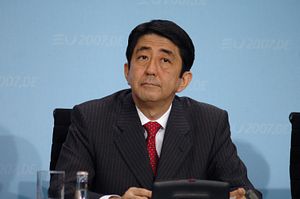As the time to decide on Japan’s next consumption tax increase draws closer, Prime Minister Shinzo Abe’s room to maneuver on the situation has shrunk considerably since the previous tax hike in April. Not only have there been no clear-cut, positive economic indicators since the economy shrank 7.1 percent in the second quarter, Abe is also now dealing with falling public opinion and dissent within his own party as to whether the next tax increase should happen next October, or perhaps be postponed until the economy has had time to recover. As December has been widely reported as the time when the prime minister will make his decision, Abe will need an economic boost from somewhere to keep his promised tax increase on track, or risk spooking investors about the long-term financial stability of the country.
Reuters reported on Sunday that a “top Japanese government official” told a small group of people the tax increase should be delayed a further year and a half to April 2017. The official said that a rise by October 2015 could be too soon, and might risk an already fragile economic recovery. The delay to April 2017 reflects what University of Shizuoka professor Etsuro Honda told a group of 40 LDP lawmakers last Wednesday, saying “There’s a great danger from the next sales tax hike given the current situation where the positive effects of ‘Abenomics’ and the negative impact of April’s sales tax hike are offsetting each other.”
This questioning of long-stated policy within the ruling party is compounded by worsening poll numbers. Public support for Abe’s Cabinet has fallen to 53 percent, a drop of nine points from early October, when his popularity spiked after the appointment of the new Cabinet. A poll conducted by the Yomiuri Shimbun on Friday and Saturday also showed that the government’s disapproval rating increased from 30 to 37 percent, while opinion on the next consumption tax increase was at a disheartening 26 percent in favor and 71 percent against. The overall drop in popularity may have more to do with the resignation of two of the new Cabinet ministers last week amidst scandals over the misuse of public and campaign funds, and a 53 percent approval rating is admittedly still an impressive figure by the standards of Japanese prime ministers, but it may constrain Abe’s ability to pursue unpopular policies.
While the prime minister told the Financial Times in an interview last week that increasing the tax at the cost of derailing the economic recovery “would render the whole exercise meaningless,” there is still an expectation that he will follow through with it. The Bank of Japan Governor Haruhiko Kuroda is still very much in favor of the tax hike, as a loss of investor confidence could lead to unsupportable increases in Japanese government bond (JGB) yields. Reuters also indicates that its poll numbers from a week ago show that Abe is likely to go ahead with the tax increase next October, although the upcoming economic data for the third quarter may end up playing a deciding factor.

































